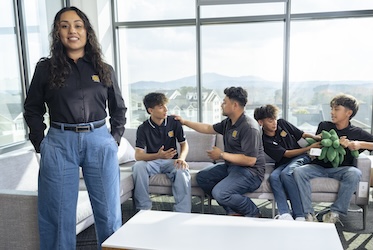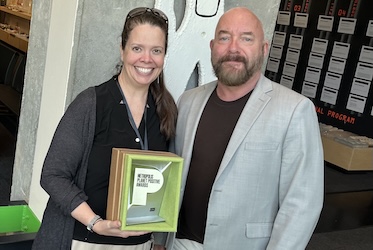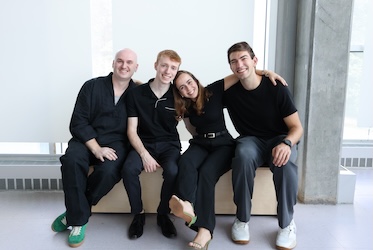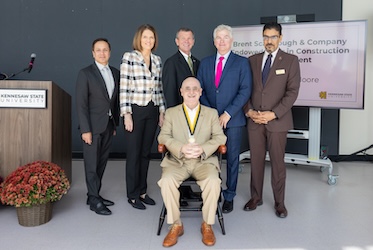

MARIETTA, Ga. | Jan 22, 2020
Students showcase research excellence in timed event
Huy Ho recalls hearing his parents speak about their escape from Vietnam and subsequent resettlement to the U.S.
He often heard of their difficulty trying to assimilate into American life despite not knowing the native language or having a support structure in place. Now a fifth-year architecture student at Kennesaw State University, he is researching how shifts in the built environment can better serve refugees like his parents.
This month, Ho was one of 11 students presenting their theses in the Cooper Carry Three Minute Thesis Competition. The event, which follows the format of the University of Queensland’s Three Minute Thesis competition, challenges students to deliver a convincing pitch for their thesis project in a short timeframe using only a single PowerPoint slide.
The event hosted by Kennesaw State’s Department of Architecture is unique in that all participants are undergraduate students, as the University is one of only a handful of programs nationwide that requires its students to pursue thesis projects while earning a professional architecture degree. KSU’s Graduate College also hosts a separate Three Minute Thesis competition for master’s and doctoral students.
In order to qualify for the competition, students begin presenting their proposals as fourth-year architecture students in a thesis prep course. From those presentations, finalists are selected to participate in the competition. Prior to the event, the finalists take part in a three-hour training session with three professional presentation coaches. During the event, students are judged by a panel composed of industry experts and academicians, and the winners are awarded cash prizes sponsored by local architecture firm Cooper Carry.
Ho, whose thesis “Camps in Crisis: Challenging the Architecture for Refugees” won first place in the competition, focused his research on improving settlements in Istanbul, Turkey, home to one of the world’s largest refugee populations. By the end of his presentation, he noted that as many as 72 refugees have been displaced as a result of the ongoing crisis.
Inspired by his parents and equipped with skills acquired through his studio coursework, Ho said he felt uniquely positioned to tackle the crisis through an architectural lens.
“Throughout this program, and in particular my experience with Three Minute Thesis, I found a greater respect for all of the problems that architecture can solve,” he said. “Of course, it can’t solve everything by itself, but the built environment is one the most important aspect of our lives.”
Like Ho, some students base their thesis projects on personal experiences while others pursue topics yet to be explored by architects. Such was the case for Hala Alfalih, whose thesis “Informing Space: A Human-centered Approach to Designing a Dwelling on Mars” won the People’s Choice Award at this year’s event.
“I wanted to take an approach that was not too personal to me but to look at something out of this world,” she said. “This is my attempt to show that architecture can be a solution. Engineers are obviously hard at work trying to get us to Mars, but how can we insert the role of a designer in making Mars dwellings more enjoyable to live in.”
Two students tied as runner-up at this year’s event: Devon Sams, who is investigating the proportion system of the golden ratio utilized in laying out and designing spaces, structural systems and creating an aesthetically pleasing environment; and Breck Small, who is proposing a new construction method for an orphanage that looks beyond the physical in a small Ugandan community outside the city limits of the country’s capital city of Kampala. Another student, Maryisa LaRosa, received the Architectural Research Centers Consortium King Medal for Research for her thesis “The Model Holistic: The Application of Adaptive Cycle to Rust Belt Cities.”
In addition to showcasing their research to an audience of peers and professionals, Liz Martin-Malikian, associate professor of architecture and thesis coordinator, said participating in the event is an excellent way for students to sharpen skills they will need in industry.
“Throughout this competition, our students are tasked with demonstrating talents that can separate themselves in a crowded field,” she said. “Being able to concisely convey your thoughts and offer a clear solution are what decision makers look for in the real world, and our students have proven to excel in this area based on their experience in this event and throughout their academic careers.”
– Travis Highfield

Kennesaw State graduate builds a future few expected

Assistant professor wins Metropolis Magazine Planet Positive Award for sustainability

Kennesaw State architecture students earn recognition in international design competition

Kennesaw State's Brian Moore installed as Brent Scarbrough and Company Endowed Chair in Construction Management
A leader in innovative teaching and learning, Kennesaw State University offers undergraduate, graduate, and doctoral degrees to its more than 51,000 students. Kennesaw State is a member of the University System of Georgia with 11 academic colleges. The university's vibrant campus culture, diverse population, strong global ties, and entrepreneurial spirit draw students from throughout the country and the world. Kennesaw State is a Carnegie-designated doctoral research institution (R2), placing it among an elite group of only 8 percent of U.S. colleges and universities with an R1 or R2 status. For more information, visit kennesaw.edu.